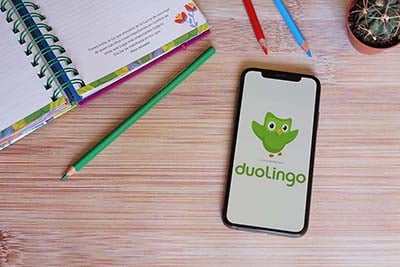The Dulolingo app which teaches you over 40 different languages just raised $35 million, bringing its valuation at $2.4 billion.
What is Duolingo?
The slogan is clear and simple: language lessons, for free, forever. Duolingo is probably the most popular app for learning languages, with over 500 million active users. They have fun lessons built specifically for easy and intuitive language learning, based on psychological and learning tricks to make foreign words stick in your mind. The app really feels like a game, except that you are learning russian instead of crushing digital candies.
Founded in 2011, The project was born in Pittsburgh in Carnegie Mellon university (same place as Hyliion, what a place full of successful kids). The initial revenue model is quite a funny story: company would send a text for which they needed a translation. Duolingo would then feed this text to their thousands of students who would exercises on parts of the text to learn their language. After receiving thousands of inputs, the would mash up everything together and give a translation back to the company.
However, this is not how they make money anymore: they have switched to a more classic model of subscription/no ads or free + add revenue, dropping the crowdsourcing model.
They have also extended their offer and even propose a Duolingo English test which is an affordable and convenient language certification that is accepted in 2'000 universities. As of today, the app offers 98 courses for nearly 40 different languages.

Recent happenings and successes
Covid really helped the EdTech industry as well. When you're tired of streaming Netflix and that you've done your miles on your brand-new Peloton bike, it's time to get back to your other lockdown resolutions. For some people, it is eating healthy or reading books, but for others, it's learning Japanese or Italian. More people indoors and in front of their screen made downloads surged up to 500 million for the app: that is a 200 million increase since May 2020!
Following this success, the company raised $35 million from investors Durable Capital and General Atlantic, bringing the company's total funding to $183 million. The investment brings the total value of the company to $2.4 billion, a decent jump from the $1.65 billion it was worth earlier this year.

“We are thrilled to deepen our partnership with Luis and Duolingo after initially investing in the business in April 2020,” said Tanzeen Syed, MD at General Atlantic. “Duolingo has successfully built foundational learning technology, an effective and engaging product, and a passionate community of users. We believe the company has additional opportunity to strengthen its market-leading position and expand its product, team, and customer base, while capitalizing on the global acceleration in digital learning.”
The app simply answers a growing need: educators and teachers are looking for innovative ways to keep their students engaged and learning. Apps like Duolingo which used to be a nice-to-have extra have become a necessity.
This is a valid statement not only for schools and universities but also for companies that still want to train their employees, and single users who want to take the opportunity of spending more time alone to grow.
This translated in a 30% increase of users for the app, with bookings on track to increase up to 100%. Although, according to Sensor Tower, this growth trend was already there pre-pandemic, with a 100% revenue growth rate that has been the norm in the past 3 years. In other terms, Duolingo was already a champion of the EdTech sector, way before the tiny bat disease hit us.
The Freemium challenge
Freemium is a basic business model where the service is free, but you must pay to have the ultimate version - think of Youtube, DeepL, Dropbox, Skype. There is one golden number even more important that the number of users: the conversion rate of free users to paying customers. As mentioned previously, you have two options on Duolingo: either you use it for free, but you have to watch a Peloton ad every now and then, or you pay a subscription to learn uninterrupted. The numbers of Duolingo are not so great regarding this measure.
Although it can proudly show 500 million app downloads, only 4% of their users are paying customers. What's more, these 4% represent 85% of the company's revenue. This shows the outstanding value of this tiny customer fraction.
In the category of freemium champion, the best example is Spotify, who absolutely mastered the game of conversion. The music-streaming app has 144 million paying customers out of its 320 million total users, which means that over 45% of their users are paying for the service. This is massive. That is also 10 times more than Duolingo, showing that the language app has more to learn about converting. The question is, how could they do it?
By offering extra features for paying customers – which they are working on. They could also make ads a little more annoying and restrict the number of languages you can learn for free, but they should be careful that this doesn’t only make users leave, without augmenting the conversion rate. The trick is to convince customers that the value of the product is so great that 10 dollars a month seem like a joke.

What’s next?
In terms of revenue diversification, they are working on new services, as they have launched features for kids - Duolingo ABC, for kids from 3 to 7. They have also produced a "true crime" podcast to help people learn Spanish through the story of a bank heist.
The company could also offer an IPO as soon as next year, although the timing could be flexible. Stay on the watch!
“One of the things that makes me proudest is that Duolingo really is used by the whole spectrum of society,” von Ahn said. “On one end there are a lot of Syrian refugees that use Duolingo to learn the language of the country that they move to... in Sweden, the most commonly learned language is Swedish and it’s because of Syrian refugees.”

Sources:
“We’re in a Baby Bust” — P&G’s diaper problem. Tesla joins the club. Duolingo translates $2.4B., in Snacks Daily Podcast
Language learning app Duolingo confirms it has raised $35M on a $2.4B valuation, in TechCrunch
Duolingo Raises $35 Million to Fuel Continued Global Growth, in PR Newswire
Duolingo Just Raised $35M. Udemy Got $50M. Both Are Valued Billions More, in EdSurge
The education app that is making equals of Bill Gates and the world’s masses, in CNBC
Read our next article: Copper hits 2-year high in new era of ‘sustainability’ and China-based contracts





